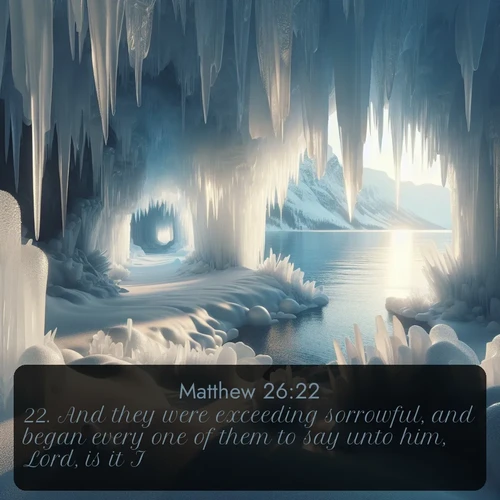Gospel of Matthew 26:22 plusieurs versions / traductions
English Bible Translations
22. And they were exceeding sorrowful, and began every one of them to say unto him, Lord, is it I?
22. And they were exceeding sorrowful, and began to say unto him every one, Is it I, Lord?
22. And they were very said, and said to him, one by one, Is it I, Lord?
22. And being exceedingly grieved they began to say to him, each of them, Is it *I*, Lord?
22. And they were exceeding sorrowful, and began every one of them to say to him, Lord, is it I?
22. And being grieved exceedingly, they began to say to him, each of them, `Is it I, Sir?'
German Bible Translations
22. Und sie wurden sehr betrübt und hoben an, ein jeglicher unter ihnen, und sagten zu ihm: HERR, bin ich's?
22. Da wurden sie sehr betrübt und fingen an, einer nach dem andern, ihn zu fragen: Herr, doch nicht ich?
French Bible Translations
22. Ils furent profondément attristés et chacun se mit à lui dire: «Est-ce moi, Seigneur?»
22. Ils furent profondément attristés, et chacun se mit à lui dire: Est-ce moi, Seigneur?
22. Ils furent profondément attristés, et chacun se mit à lui dire: Est-ce moi, Seigneur?
22. Et, en étant fort attristés, ils commencèrent, chacun d'eux, à lui dire: Seigneur, est-ce moi?
22. Et ils en furent fort attristés, et chacun d'eux commença à lui dire : Seigneur, est-ce moi?
22. Et ils furent fort affligés, et chacun d'eux se mit à lui dire: Seigneur, est-ce moi?
Versions with Strong Codes
Matthew 26 / KJV_Strong22. And[G2532] they were exceeding sorrowful,[G3076] [G4970] and began[G756] every one[G1538] of them[G846] to say[G3004] unto him,[G846] Lord,[G2962] [G3385] is[G1510] it I?[G1473]
Strong Code definitions
G2532 kai/kahee apparently, a primary particle, having a copulative and sometimes also a cumulative force; and, also, even, so then, too, etc.; often used in connection (or composition) with other particles or small words:--and, also, both, but, even, for, if, or, so, that, then, therefore, when, yet.
G3076 lupeo/loo-peh'-o from G3077; to distress; reflexively or passively, to be sad:--cause grief, grieve, be in heaviness, (be) sorrow(-ful), be (make) sorry. see G3077
G4970 sphodra/sfod'-rah neuter plural of sphodros (violent; of uncertain derivation) as adverb; vehemently, i.e. in a high degree, much:-exceeding(-ly), greatly, sore, very.
G756 archomai/ar'-khom-ahee middle voice of G757 (through the implication, of precedence); to commence (in order of time):--(rehearse from the) begin(-ning). see G757
G1538 hekastos/hek'-as-tos as if a superlative of hekas (afar); each or every:--any, both, each (one), every (man, one, woman), particularly.
G846 autos/ow-tos' from the particle au (perhaps akin to the base of G109 through the idea of a baffling wind) (backward); the reflexive pronoun self, used (alone or in the comparative 1438) of the third person , and (with the proper personal pronoun) of the other persons:--her, it(-self), one, the other, (mine) own, said, (self-), the) same, ((him-, my-, thy- )self, (your-)selves, she, that, their(-s), them(-selves), there(-at, - by, -in, -into, of, -on, -with), they, (these) things, this (man), those, together, very, which. Compare 848. see G109 see G1438 see G848
G3004 lego/leg'-o a primary verb; properly, to "lay" forth, i.e. (figuratively) relate (in words (usually of systematic or set discourse; whereas G2036 and 5346 generally refer to an individual expression or speech respectively; while 4483 is properly to break silence merely, and 2980 means an extended or random harangue)); by implication, to mean:--ask, bid, boast, call, describe, give out, name, put forth, say(-ing, on), shew, speak, tell, utter. see G2036 see G5346 see G4483 see G2980
G846 autos/ow-tos' from the particle au (perhaps akin to the base of G109 through the idea of a baffling wind) (backward); the reflexive pronoun self, used (alone or in the comparative 1438) of the third person , and (with the proper personal pronoun) of the other persons:--her, it(-self), one, the other, (mine) own, said, (self-), the) same, ((him-, my-, thy- )self, (your-)selves, she, that, their(-s), them(-selves), there(-at, - by, -in, -into, of, -on, -with), they, (these) things, this (man), those, together, very, which. Compare 848. see G109 see G1438 see G848
G2962 kurios/koo'-ree-os from kuros (supremacy); supreme in authority, i.e. (as noun) controller; by implication, Master (as a respectful title):-- God, Lord, master, Sir.
G3385 meti/may'-tee from G3361 and the neuter of G5100; whether at all:--not (the particle usually not expressed, except by the form of the question). see G3361 see G5100
G1510 eimi/i-mee' the first person singular present indicative; a prolonged form of a primary and defective verb; I exist (used only when emphatic):--am, have been, X it is I, was. See also 1488, 1498, 1511, 1527, 2258, 2071, 2070, 2075, 2076, 2771, 2468, 5600. see G1488 see G1498 see G1511 see G1527 see G2258 see G2071 see G2070 see G2075 see G2076 see G2771 see G2468 see G5600
G1473 ego/eg-o' a primary pronoun of the first person I (only expressed when emphatic):--I, me. For the other cases and the plural see 1691, 1698, 1700, 2248, 2249, 2254, 2257, etc. see G1691 see G1698 see G1700 see G2248 see G2249 see G2254 see G2257
Prédications qui analysent les thèmes Évangile selon Matthieu 26
Thèmes : L'entrée à Jérusalem; La parabole des deux fils; La parabole des vignerons; Le piège des pharisiens; La résurrection des morts; Le plus grand commandement; La question de David; L'avertissement contre les scribes; L'offrande de la veuveFil Rouge de la Bible 11c: Jésus de Nazareth sa mort
Related Sermons discussing Gospel of Matthew 26
Themes : L'entrée à Jérusalem; La parabole des deux fils; La parabole des vignerons; Le piège des pharisiens; La résurrection des morts; Le plus grand commandement; La question de David; L'avertissement contre les scribes; L'offrande de la veuveRed Thread of the Bible 11c: The death of Jesus of Nazareth (Matthew 26)
see also: Bible Key Verses ; KJV Bible Images, BBE Bible images

